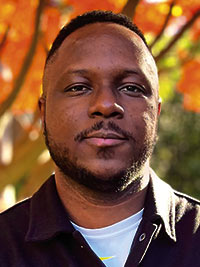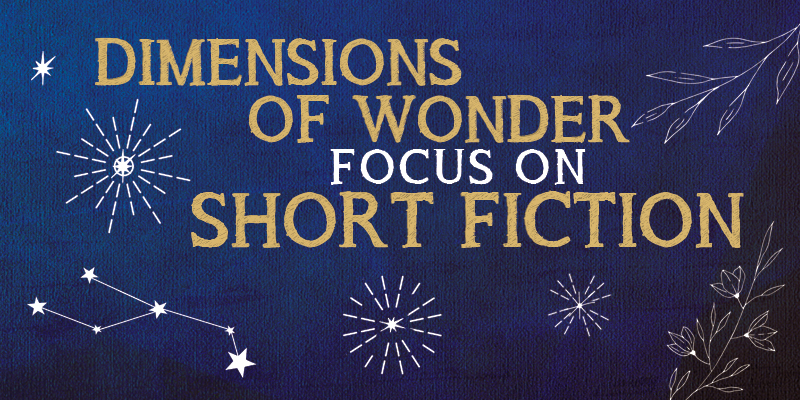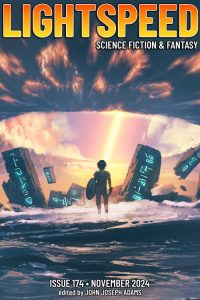Spotlight on: Tobi Ogundiran, Author
TOBI OGUNDIRAN is the author of Jackal, Jackal, a collection of dark and fantastic tales. Ogundiran has been nominated for BSFA, Shirley Jackson, Ignyte, and Nommo awards. His work has appeared in The Book of Witches and Africa Risen, and in several Year’s Best anthologies. His debut novella, In the Shadow of the Fall, is out from Tordotcom in 2024. Born and raised in Nigeria, he spent seven years in Russia, where he trained as a physician, and now lives and works in the southern US.
You began publishing SF stories about five years ago. Describe how you got your start as a writer, and your path to publication.

I came to short fiction by chance. The goal was always to publish a novel, as the received wisdom was that if one wanted to earn some sort of living through writing, or reach a wider audience, then publishing full-length novels was the way to go. As a teen, I wrote and queried three novels to several degrees of failure. Then in my third year of medical school, I suddenly realised that this thing (writing) which I loved, had taken a backseat in my life, and if I neglected it then I might never return to it. Novels notoriously take time, and I was loath to write yet another one that would get ignored by agents. I thought a short story collection would be easier (it wasn’t, but that naïveté was my saving grace). So in the summer of 2017, I wrote my first two stories. Shortly after, I discovered SF/F magazines and the very notion that you could sell individual stories and actually make money felt to me like I had stumbled upon an oil well. I sent out the first story and it got accepted. That was the long-sought-out validation that I needed – someone had read my story, loved it so much to offer me money for it. That fed into the cycle and I’ve been going strong ever since.
Your first collection, Jackal, Jackal, came out this year. Tell us about it.
Jackal, Jackal is a collection of 18 dark and fantastical stories. It’s for lovers of fairy tales and folk tales and fables. I did not realise it while writing the stories, but apparently I am preoccupied with the welding of African (particularly Nigerian) folk tales and Western fairy tales to create this new amalgamation of modern fables. I am proud of the book, and the reception has been truly mind-blowing.
You’re from Nigeria, spent time in Russia, and now live in Oxford MS. How have those different landscapes influenced your work?
The funny thing is I never started to write about Nigeria until I left Nigeria. There is something to be said for displacement, which often affords one a vantage, if not wholly objective, view of one’s erstwhile place of domicile. In my time in Russia, I was concerned with living and surviving in a strange land with strange customs and never really thought much about writing about it. (Which makes sense: one has to live, and be fully present in each moment in order to write). It is only after leaving Russia, the full breadth of my experience having accreted, that I began to write about it. There’s a story in my collection in which a Nigerian immigrant in Russia finds himself drawn into a world in which figures from Russian folklore roam free. In a review for Locus, Wole Talabi described it as an ‘‘excellent metafictional story that can also be interpreted as an immigrant’s fever dream of Russia.’’ And I realised he was right. So who knows? Perhaps when I leave Mississippi I’ll find my pen immortalising it.
Your debut novella In the Shadow of the Fall is forthcoming. What are the differences for you between stories and novels? Are there advantages or drawbacks to each form?
A good piece of short fiction is one that centres around an idea or experience and sticks closely to it with little to no deviation from the central conceit. The structure of a short story also allows for experimentation with form and indeed most innovations in storytelling are seen in short fiction before they eventually make their way to the novel. A novel, particularly a commercial novel, that flaunts its experimentation will ask a lot of the reader. (Simon Jimenez’s The Spear Cuts Through Water is unapologetic and largely successful in its experimentation.) In a successful short story, every word matters. A short story with fillers or extraneous scenes has failed. On the other hand, the nature of a novel is such that it allows the story to linger, allowing for subplots, fleshed-out moments and deeper characterizations, all of which conspire to give a rich and rewarding reading experience.
These are just my own opinions, and nothing is absolute. Generally, I think both forms serve a purpose, excelling when they lean into the constraints of the form. Where they start to fail is when an author tries to make a novel out of a short story and vice versa.
Why do you write fantasy and horror instead of, say, crime stories or literary fiction?
I like to think that I write life as it truly is. Our ancestors, the first storytellers, were wise to this. What is the epic of Gilgamesh, Beowulf, The Ramanaya, and other ancient myths from cultures the world over but ‘‘fantasy’’ as we call it today? There is magic and wonder and horror in the world. And I am endlessly fascinated with the way they influence the human condition. Genre divide is a relatively modern construct – even strict realism is a recent movement. These are all strands of the one true genre. There’s romance and horror, introspective navel-gazing, even crime in fantasy.
What’s happening next for you? Are there any upcoming stories or other projects you’re particularly excited about?
I’ve just turned in book two of my duology (which starts with In the Shadow of the Fall, out July 2024) to my editor. It is about an acolyte who tries to trap a god but instead finds herself drawn into a centuries-old war. I’m really excited about it. I’ve also got an idea which I’ve been itching to begin, continuing my blending of folk tales and fairy tales. I’ve had the idea for a while now but for now I’m taking a much-needed break before I start on it.
FOR MORE FROM OUR FOCUS ON SHORT FICTION ISSUE…
 While you are here, please take a moment to support Locus with a one-time or recurring donation. We rely on reader donations to keep the magazine and site going, and would like to keep the site paywall free, but WE NEED YOUR FINANCIAL SUPPORT to continue quality coverage of the science fiction and fantasy field.
While you are here, please take a moment to support Locus with a one-time or recurring donation. We rely on reader donations to keep the magazine and site going, and would like to keep the site paywall free, but WE NEED YOUR FINANCIAL SUPPORT to continue quality coverage of the science fiction and fantasy field.
©Locus Magazine. Copyrighted material may not be republished without permission of LSFF.








